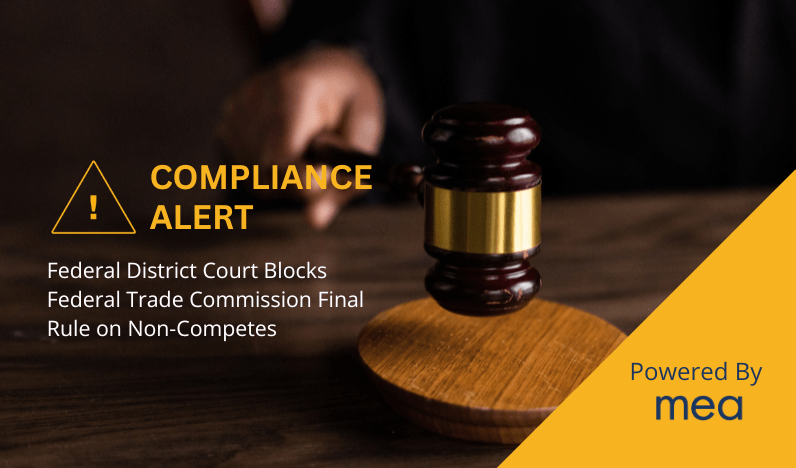On August 20, 2024, a judge in the United States District Court for the Northern District of Texas issued a nationwide injunction barring the implementation of the Federal Trade Commission’s (FTC) controversial final rule that would have prohibited non-competition agreements with workers.
The FTC adopted the final rule on April 23, 2024. With limited exceptions, the rule effectively would have banned all non-compete agreements – and provisions that functioned as non-competes – between businesses and virtually all workers as “unfair method[s] of competition.” The final rule also would have required companies to refrain from enforcing most existing non-compete agreements and to notify workers that any non-compete obligations were now unenforceable. The rule had been scheduled to take effect on September 4, 2024.
The FTC’s sweeping prohibition would have covered agreements with any worker, including employees, independent contractors, externs, interns, volunteers, apprentices, or sole proprietors who provide a service to a client or customer. In issuing the final rule, the FTC argued that non-competition clauses restrict workers’ freedom to change jobs, thus stifling competition and innovation. The agency claimed that non-competes often disadvantage workers, particularly those in low-wage positions, by limiting their opportunities for career advancement and wage growth.
In its August 20, 2024 ruling, the Texas federal court challenged the FTC’s authority to enact such a broad and all-encompassing regulation. The court expressed concerns that the FTC may have overstepped its legal boundaries by attempting to regulate employment contracts, which traditionally have been governed by state law. The ruling emphasized that employment law, including the enforcement or prohibition of non-compete agreements, has long been within the purview of individual states, rather than the federal government.
Since the publication of the final rule in April, it has been subject to various legal challenges, with mixed results. On July 3, 2024, the United States District Court for the Northern District of Texas had granted a limited preliminary injunction staying enforcement of the FTC’s final rule prohibiting non-compete clauses, but only as to the parties in that case, pending a final ruling on the merits. On August 20, 2024, the same court issued the significantly broader ruling described above.
What Should Businesses Do Now?
Businesses that were planning to comply with the FTC’s final rule by rewriting template agreements and issuing notices to current and former employees regarding the rule’s effects can now halt those efforts, as the non-compete rule will no longer take effect on September 4, 2024. However, given the increasing attention to non-compete agreements at the state and federal level, companies should maintain efforts to update and implement their restrictive covenant programs so that each worker agreement is narrowly tailored to protect only the organization’s legitimate business needs.
Employers should consult with experienced human resources professionals and/or labor and employment counsel with any questions regarding these complex employment law issues. For all MEA Members, the Hotline is available to provide this assistance. For MEA Essential and Premier members, a Member Legal Services attorney is available for additional consultation.
Who is MEA?
MidAtlantic Employers’ Association delivers comprehensive HR-driven business solutions designed to help companies grow. Whether you need support for a single project or complex issues, you have access to seasoned professionals who are experts in their fields and dedicated to serving you well. Our collaborative, accessible, and responsive nature allows us to help you find solutions aligned with your goals. Whatever your goals are, we can help you develop better people and better outcomes so they can be achieved.
To learn more, contact us today to schedule a consultation, help us understand your needs, and learn how we can help.
*This Alert is provided for general informational purposes only and does not constitute legal advice.

